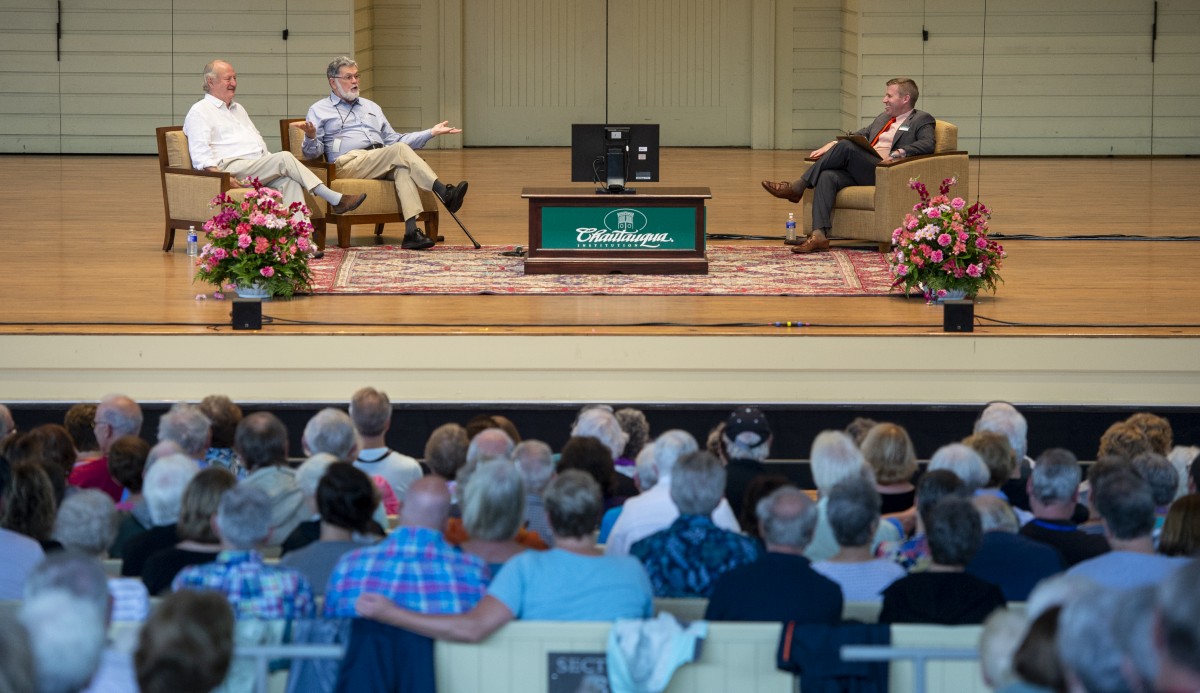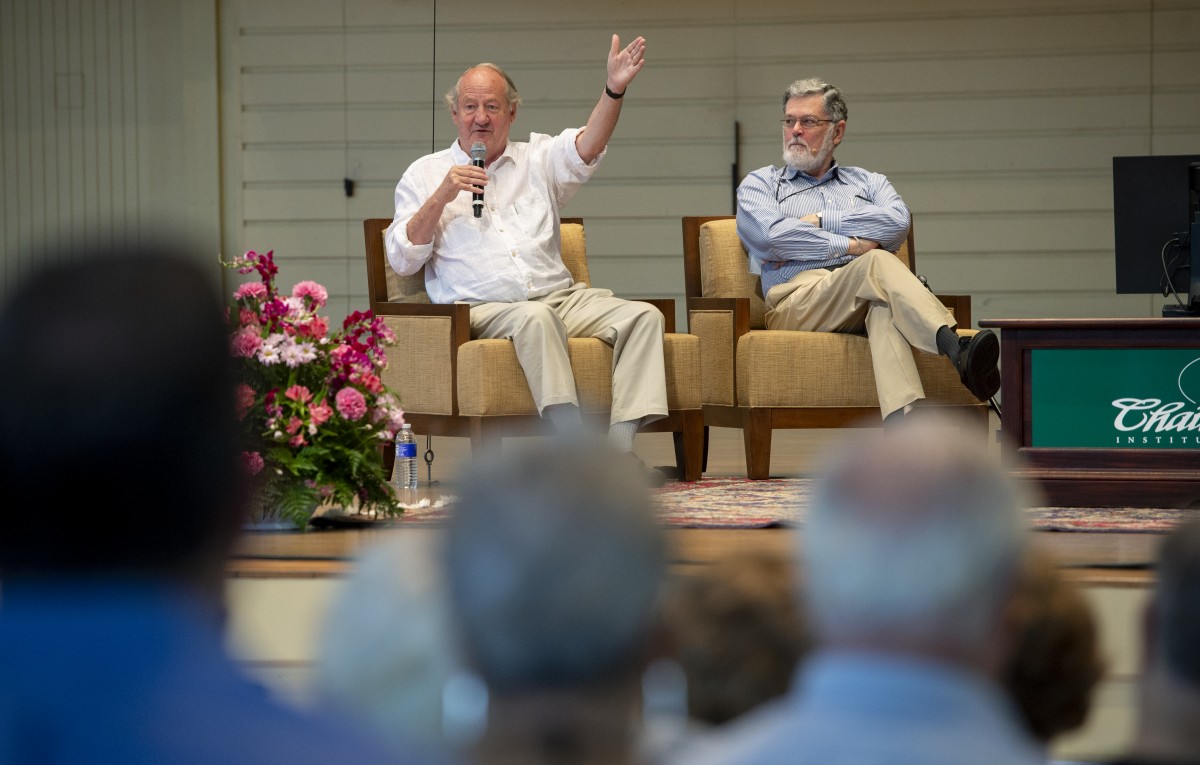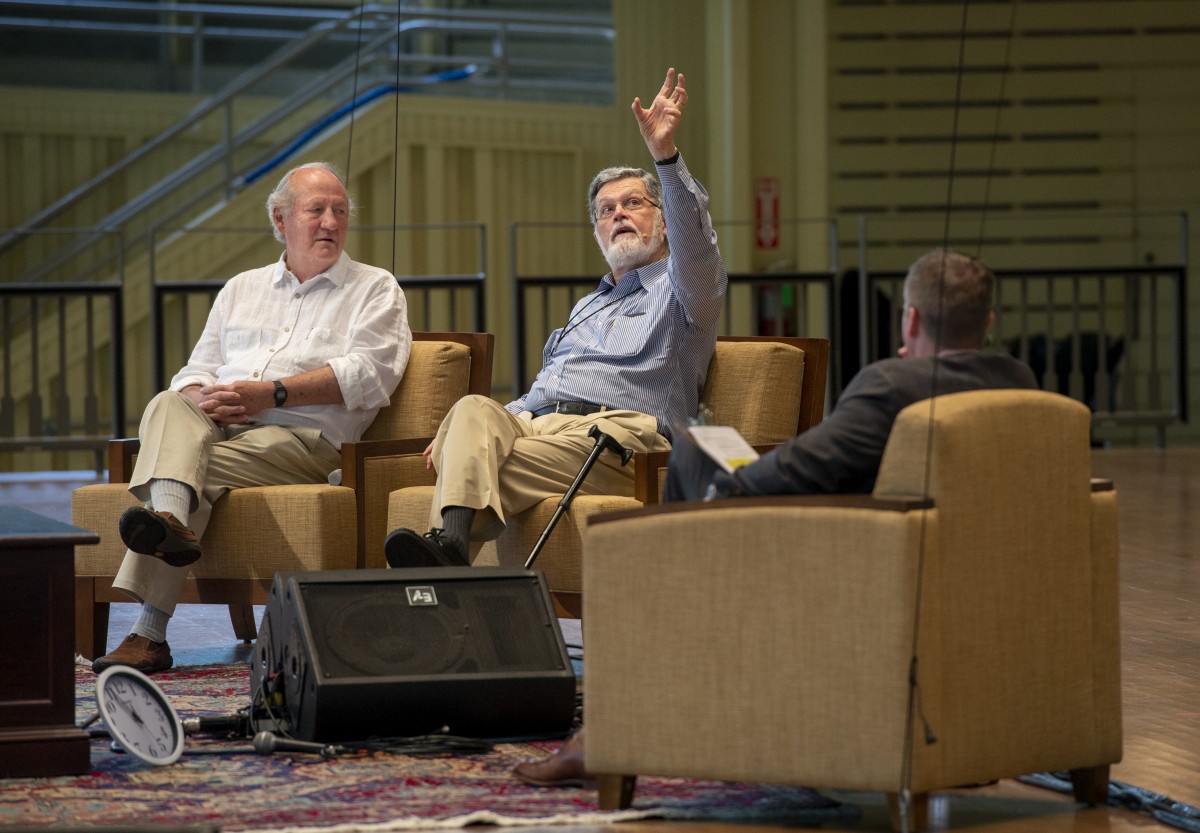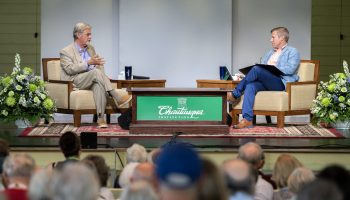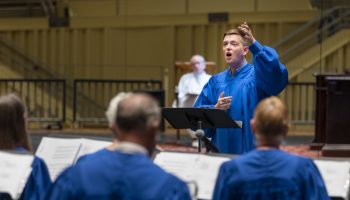Behind the scenes, Geoffrey C. Ward and Dayton Duncan work to bring the written word to life — with the occasional on-screen, or onstage, appearance.
The two filmmakers, scriptwriters and authors discussed processes and their bodies of work at Tuesday’s 10:45 a.m. morning lecture on Aug. 20 in the Amphitheater, a continuation of Monday’s “The Filmmaker as Collaborator” conversation with director and filmmaker Ken Burns.
Burns was not able to participate in the morning’s conversation, but he prepared a video message with opening remarks, in which he assured the Amp audience they were in good hands. If they enjoyed Burns’ films, he said, it was thanks to Duncan and Ward’s writing — if the audience did not, it was all Burns’ fault.
Duncan and Ward have worked extensively with Burns; Ward has collaborated with him since 1984. He was the sole or principal writer for “The Civil War,” “Baseball,” “Jazz,” “Mark Twain,” “The Roosevelts: An Intimate History” and “The Vietnam War.” An award-winning author, Ward has written various companion volumes for Burns’ series. His book A First-Class Temperament: The Emergence of Franklin Roosevelt was a finalist for the Pulitzer Prize.
He won two Writers’ Guild Awards, seven Christopher Awards and five Emmy Awards. In 2018, Ward was awarded the Writers Guild’s Ian McLellan Hunter Award for Career Achievement.
Duncan has worked alongside Ward on films including “The Civil War” and “Mark Twain”; he worked with Burns on films like “Lewis & Clark: The Journey of the Corps of Discovery” and “The National Parks: America’s Best Idea,” which won him two Emmy Awards. “The Dust Bowl,” which he wrote, won a Spur Award and was nominated for two Emmys.
Prior to his work in documentary films, Duncan served as chief of staff to former New Hampshire Gov. Hugh Gallen; Walter Mondale’s deputy press secretary during his 1984 presidential campaign; national press secretary for Michael Dukakis’ 1988 presidential campaign; and as chair of the American Heritage Rivers Advisory Committee.
The men were joined on stage by Chautauqua Institution President Michael E. Hill, who moderated the conversation as part of Week Nine’s theme, “Documentary Film as Facilitator: Storytelling, Influence and Civil Discourse.”
Hill opened the conversation by asking the writers to describe their writing processes.
“I don’t quite think of it as a process,” Ward said. “What we do is we get interested in a subject. There is no subject that isn’t interesting, it seems to me. I wrote the history of baseball, to which I could care less. And during the year and half it took to write it, I was fascinated by it. I lost interest right after that.”
Ward said much of his process is dedicated to reading; he reads dozens of books on a topic, carefully dissecting each word. Eventually, it’s guilt — and the deadline — that forces him into writing.
“There’s a point in which you just say to yourself, ‘They’re not paying me to read; I really, really have to get started,’ ” he said. “I start with the prologue; I’m sort of simple-minded that way. I want to get the first scene set, and then everything else trails from that. I guess if there are any rules for me, (it’s) chronology is God.”
While Ward is copiously reading and scarcely writing, Burns and producers, like Duncan, are conducting interviews, which are then sliced and diced and pieced together into the script.
“The story is what we do,” Duncan said. “We tell stories that happen to have a place. We tell stories that try to put you as much as we can into that moment of history, of the contingency of history.”
Duncan, who oscillates between producer and writer, also immerses himself joyfully into literature when working on a film — something the former reporter loves doing, he said. His timeline for writing is deadline-driven, often looking over his own shoulder as a producer to nudge his writer-self along. Unlike Ward, Duncan starts writing at the first narrated scene; the prologue comes later in the process.
Eventually, the men collaborate in the editing stages, which Hill asked about next: Does collaborating on texts change their processes?
The two writers initially collaborated by accident, when Ward fell gravely behind schedule on “The West” and Duncan swooped in to help. Since then, the men have co-written and worked on several films seamlessly. Duncan attributes this to having similar narrative voices that mesh their writing styles.
Aside from being nose-deep in a book or hunched over a keyboard, Duncan and Ward have both managed to be featured on screen — outside of the credits — in Burns’ films. Duncan made his debut in a film on what he called a captivating subject: “The National Parks: America’s Best Idea.”
“This was something very much a part of something that I felt was an important topic to do, and I wanted for us to approach it as not just a travel log or a nature film — which it has a little bit of — but (as) a story of an idea,” he said. “It is the Declaration of Independence applied to a landscape, saying that the most majestic places and sacred places in our land are available to everyone — everyone.”
They played a clip from the six-episode series featuring the story of John Muir, whose activism helped preserve what is now Yosemite National Park. In it, Duncan spoke to Muir’s quirky nature.
Ward appeared in the 2014 documentary film “The Roosevelts: An Intimate History,” which he also wrote. He has written extensively about the Roosevelts in his aforementioned book A First-Class Temperament, as well as in Closest Companion: The Unknown Story of the Intimate Friendship Between Franklin D. Roosevelt and Margaret Suckley and Before the Trumpet: Young Franklin Roosevelt.
A scene played from “The Roosevelts” centered around President Franklin D. Roosevelt’s battle with polio. Ward was featured discussing Roosevelt’s prognosis, while dismantling the belief that “polio didn’t bother him.” After the clip, Ward commented on this history’s modern-day relevance:
“Sadly, though we a have far more civilized and intelligent view of people who are disabled, I think in this era no one as badly handicapped as Franklin Roosevelt could ever be elected president of the United States. … I think that’s a tragedy, but I think that is true.”
To close the morning, Hill asked the screenwriters and authors how writing for film differs from writing a book.
“I like them both,” Ward said. “I like the collaborative process of making films. The plus of writing a book is, it is all your own book, and hell to anybody else.”
A book cannot capture the emotion of hearing a story told through thrilling narration, Duncan said.
“When it works, it is magic,” he said.
After the conclusion of their conversation, Hill switched from the chair to the podium for the Q-and-A portion of the morning. Piggybacking off of Monday’s lecture, Hill asked: “What’s next?”
Duncan is amid production of “Country Music” — which the Amp audience previewed Monday — a documentary chronicling the history of the “uniquely American art form.” Duncan said “Country Music” will be the last documentary he will produce. He has also been commissioned to write the script for Burns’ film about Benjamin Franklin and American buffalo.
Ward is writing Burns’ upcoming documentaries on the American Revolution and President Lyndon Johnson.
Hill then turned to the audience for questions. One attendee asked how the filmmakers, as white men, give a voice to minorities in their films.
“I am not responsible for my gender or my race,” Duncan said. “I am responsible for how I can or how I tell what I think are important stories of America in this experiment of democracy on this continent — and it still is an experiment. … (In) my storytelling, I try as hard as I can — within the limits of (being a) white kid from a small town in Iowa — to try to embrace that tapestry and the rich stories that are there and the importance of that. It’s unfinished business, and all I can be responsible for is doing my damnedest to tell that right.”


